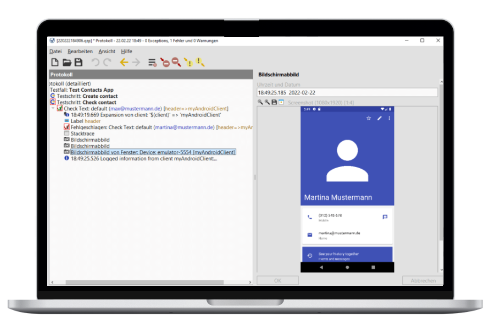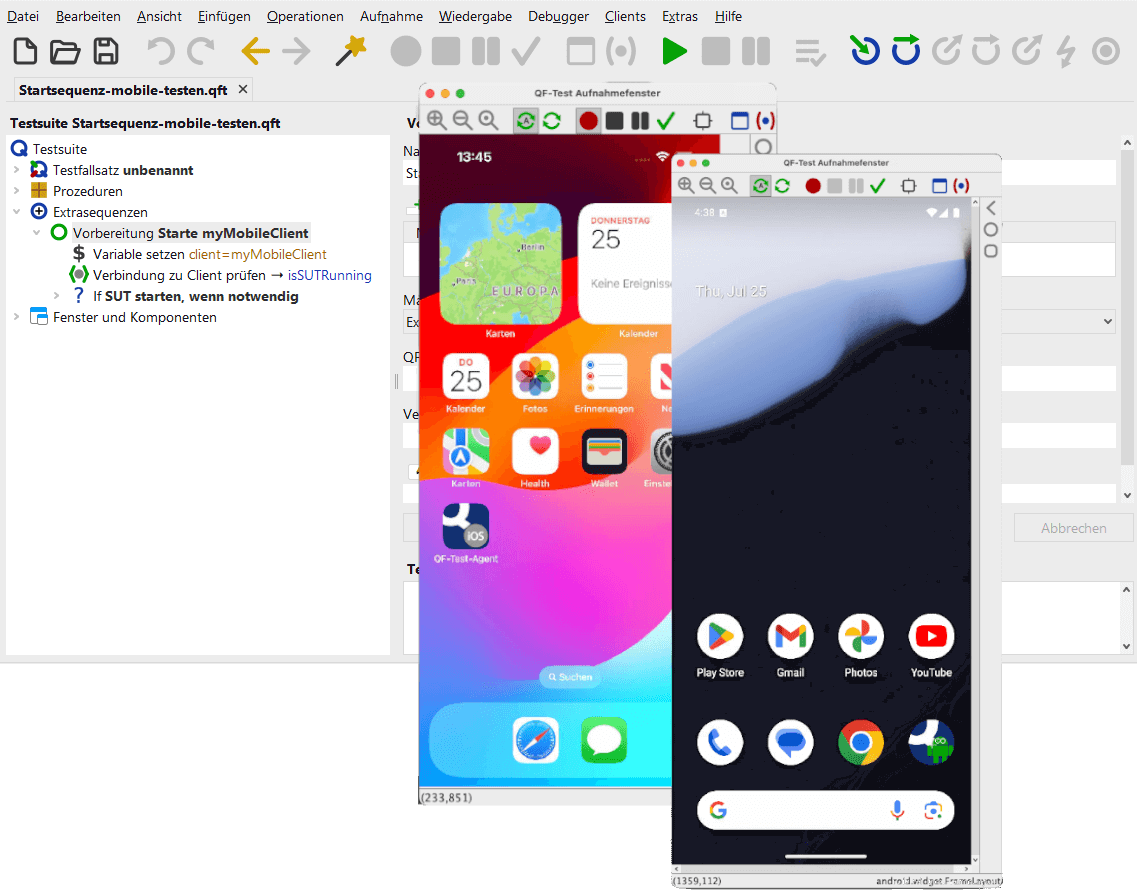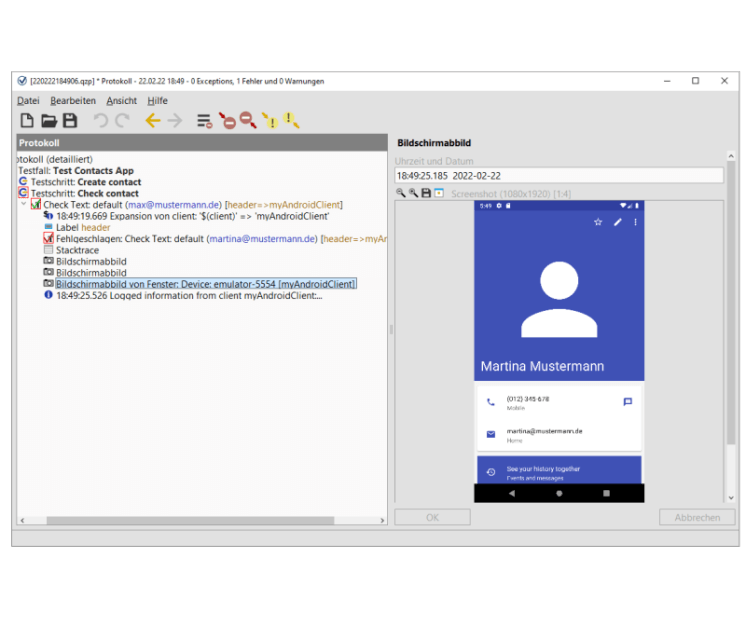Automate app testing – reliable testing with QF-Test
In today's software development, app testing is essential to ensure the quality, functionality and stability of mobile applications. Apps must function reliably on a wide range of mobile devices with different operating systems and screen sizes. Especially as complexity increases and development cycles shorten, manual testing reaches its limits: it is time-consuming, error-prone and hardly scalable. Automated app testing, on the other hand, enables test cases to be executed quickly and repeatably – reducing sources of error, increasing the efficiency of the testing process and ensuring more reliable releases.
QF-Test offers a powerful solution for automating mobile app testing on Android and iOS platforms. This allows you to ensure the quality of both native and hybrid applications and benefit from the high reusability of your test cases. From software developers to QA and development teams – anyone who wants to test apps and deliver high-quality applications can benefit from QF-Test.
Rely on automated app testing with QF-Test to shorten time-to-market, increase build stability and improve end-user acceptance of your apps. This makes app testing a key element of your DevOps workflow and successful, continuous development.
App testing with QF-Test: Features
Cross-platform app testing for Android & iOS
QF-Test is your powerful partner for testing apps on all popular mobile platforms. The tool supports native and hybrid applications on current Android and iOS devices, regardless of whether you work with emulators, simulators or real devices. High compatibility guarantees reliable testing from Android 7 and iOS 15 onwards – covering new devices and upcoming operating system versions.
Simulation of realistic user interactions
QF-Test precisely replicates authentic user interactions: taps, swipes, scrolls or keyboard inputs can be accurately mapped and saved as test cases. This allows you to test the functionality of your mobile apps in a realistic manner and obtain well-founded statements about usability for your entire target group.
Easy setup with quick start wizard
The initial setup in mobile app testing is particularly convenient with QF-Test: the quick start wizard guides you step by step through the setup of all necessary components – for Android and iOS alike. This makes it easy to get started even without in-depth technical knowledge, and test automation can begin immediately.
Convenient recording and test creation
With the innovative recording window, you can intuitively record user actions during automated mobile app testing. QF-Test translates the actions directly into structured, comprehensible test steps, which speeds up test creation and reduces the programming effort for the entire development team.
Stable tests thanks to robust component recognition
QF-Test offers particularly stable component recognition: if the user interface or structure of your app changes during development, your test cases remain low-maintenance and efficient. This saves resources and enables reliable regression and functional testing over the long term.
One test for all devices thanks to SmartID
Thanks to innovative SmartID technology, you can run a single test case on a wide variety of device types and screen sizes – without separate adjustments. Automated app testing thus becomes a real efficiency booster and contributes significantly to the optimisation of the entire testing process.
What is app testing?

App testing – or the structured testing of mobile applications – is a central process in today's software development. The aim of app testing is to put the functionality, stability and user-friendliness of your application to the test before and after it is released.
A well-designed testing process helps you to
- identify errors at an early stage,
- prevent regressions and
- ensure consistently high quality for your app across all platforms and device types.
In the context of mobile app testing, various types and methods of testing are used, such as functional tests, regression tests, and performance tests, to cover all aspects of your app. It is particularly important that testing takes into account end devices, operating systems, and various screen sizes to ensure an optimal user experience for the entire target group.
With growing competition in the app market, high-quality app testing is a crucial success factor that significantly supports not only the development but also the maintenance and further development of mobile applications. That is why automated and efficient app testing is now an integral part of agile and DevOps-oriented development processes.
How does mobile testing work with QF-Test?
If you want to test apps, there are various testing methods available. Classic manual testing involves testers manually running through all the functions of the application – a method that is flexible but time-consuming and resource-intensive. Automated app testing with QF-Test, on the other hand, executes test cases quickly, repeatably and reliably – ideal for continuous integration and rapid releases.
The difference between platforms plays an important role here: native apps for Android or iOS, hybrid applications and web apps sometimes have different requirements and modes of operation. For comprehensive mobile app testing, you need to adapt your tests to the respective platform and to various device-specific characteristics (e.g. size, resolution, OS version).
The selection of suitable test environments is crucial. You can test your app on real devices, emulators or simulators. Only the right mix enables realistic test results with high efficiency.
With QF-Test, you can rely on smart automation: reusable test cases, robust component recognition and convenient recording functions make automated mobile app testing productive and transparent for developers and QA teams alike.
Video tutorial: How to test iOS apps automatically with QF-Test
In this recording of our special webinar “iOS included: Testing mobile apps with QF-Test 8”, we show you how to conveniently record and efficiently automate tests for iOS applications. Our experts reveal practical tricks and tips.
Why is it important to conduct app testing?
The demands placed on modern apps are high – they must function flawlessly on a wide variety of mobile devices, operating system versions and screen sizes. Without structured app testing, there is a risk of incompatibilities, functional limitations and a compromised user interface. A key objective is therefore to identify and eliminate errors and regressions early in the development process before end users are affected.
Negative user experiences due to faulty applications often lead to poor ratings and ultimately uninstalls – with a negative impact on the company's image. Demonstrate your commitment to quality with professional mobile app testing and ensure that your application performs well under real-world conditions.
Precisely because of rapid development cycles and DevOps-driven processes, app testing should be a continuous, automated part of your workflow. This ensures consistently high quality, reduces the workload on your support team and ensures smooth releases – no matter how complex your app is or how often it is updated.
What types of tests are important in app testing?
In mobile app testing, various types of tests are crucial to ensure all aspects of your applications' quality:
- Functional tests: These test cases check whether the app correctly fulfils the specified requirements and functions. They detect errors in workflows and help to ensure the basic functionality of the application.
- Performance tests: These measure response times, memory consumption and other performance data of the app. This allows you to detect bottlenecks and guarantee the stability of your application even under load.
- Regression tests: With every change in development, regression tests must ensure that new functions do not unintentionally affect existing areas. Automated regression tests offer the necessary repeatability and stability across all release cycles.
Accessibility tests: These tests check whether your app is accessible to all user groups. This applies to both the user interface and interactions – an increasingly important requirement for reaching all target groups and complying with legal requirements
QF-Test supports you in all types of testing and enables the efficient implementation of a wide variety of testing methods for the highest software quality.
QF-Test in camparison
Compared to the competing product Tosca, QF-Test offers various advantages as a mature tool for test automation.
Mobile app testing automated and efficient with QF-Test
Put your trust in QF-Test and make app testing a key component of your development strategy.
Benefit from:
- Cross-platform testing for Android and iOS
- Stable, low-maintenance test cases thanks to intelligent component recognition
- Efficient test creation even without programming knowledge
- Flexible execution of your tests on real mobile devices, emulators and simulators
- Seamless integration into agile and DevOps processes
With QF-Test, you can automate your mobile app testing directly from development. This strengthens your team, ensures quality and guarantees the highest reliability of your applications – giving your app a decisive competitive advantage. Try QF-Test now and take test automation for mobile applications to the next level!









